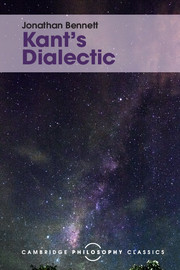Book contents
- Frontmatter
- Contents
- Preface to this edition by Karl Ameriks
- Preface
- System of references
- 1 Introduction
- 2 Concepts and intuitions
- 3 Substances and reality
- 4 The substantiality of the soul
- 5 The simplicity of the soul
- 6 The identity of the soul
- 7 Infinity
- 8 Limits
- 9 Divisibility
- 10 Freedom
- 11 God
- 12 Reason
- Index
- Frontmatter
- Contents
- Preface to this edition by Karl Ameriks
- Preface
- System of references
- 1 Introduction
- 2 Concepts and intuitions
- 3 Substances and reality
- 4 The substantiality of the soul
- 5 The simplicity of the soul
- 6 The identity of the soul
- 7 Infinity
- 8 Limits
- 9 Divisibility
- 10 Freedom
- 11 God
- 12 Reason
- Index
Summary
The antinomies chapter
In Kant's usage, an ‘antinomy’ is a pair of good-looking arguments for apparently conflicting conclusions. In the chapter on the Dialectic to which I now turn, he offers four antinomies, each purporting to exhibit a conflict which can be resolved only with help from Kantian philosophy. Sometimes Kant suggests that his principles discredit the questions to which the antinomal arguments offer answers, but he also suggests that in the first two antinomies each of the opposing conclusions may be false, while in the third and fourth both conclusions may be true. Indeed, no one account will do. The chapter is in fact a medley, and the several sorts of unity claimed for it are all spurious.
For one thing, the ostensible topic is cosmology, or ‘the world-whole’ (434); but only the first antinomy, about the age and the size of the world, clearly has such a topic. The second antinomy concerns the infinite divisibility of matter, and is ‘cosmological’ only in a stretched sense. The third concerns the first event that ever happened, but Kant rapidly moves on from that into a perfectly uncosmological problem about human freedom. The fourth antinomy, about the existence of a ‘necessary being’, is cosmological enough, but it heavily overlaps the discussion in the theology chapter of the ‘cosmological argument’ for the existence of God.
Kant's poor selection of material for the antinomies chapter may be partly due to his bad theory, to be discussed in my final chapter, about how all the Dialectic's troubles arise from reason's inherent tendency to error. Although most of the Dialectic's serious content can be grasped without reference to this theory, it does make its presence felt in the antinomies chapter, among other things by providing the setting for Kant's feeble account of why there are exactly these four antinomies (442–3). I do not know whether the theory of reason actually constrained Kant to select these four, or merely helped him to rationalize a selection he had made on other grounds.
In expounding the alleged fault-line running through the faculty of reason, Kant speaks of ‘a natural and inevitable illusion’, a ‘dialectic’ which is ‘inseparable from human reason, and which, even after its deceptiveness has been exposed, will…continually entrap [reason] into momentary aberrations ever and again calling for correction’.
- Type
- Chapter
- Information
- Kant's Dialectic , pp. 115 - 144Publisher: Cambridge University PressPrint publication year: 2016

